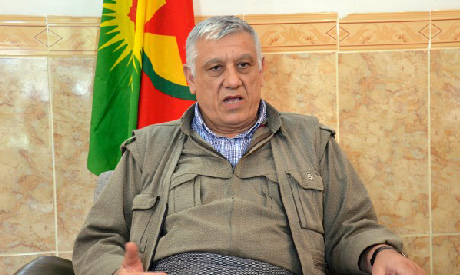
File Photo: Cemil Bayik, a founding member of the Kurdistan Workers Party (PKK) Oct. 19, 2013 (Photo: Reuters)
Kurdish separatist fighters want an international mediator, possibly the United States, to help get peace talks with Turkey back on track and avert an escalation of their insurgency, the head of the group's political wing told an Austrian newspaper.
Cemil Bayik, a founding member of the Kurdistan Workers Party (PKK) and its most senior figure at liberty, also reiterated accusations that Turkey was waging a proxy war against the Kurds in neighbouring Syria by backing Islamist rebels fighting them in the north of that country.
Syria's civil war has complicated Turkey's efforts to make peace with its own Kurds but Ankara strongly denies backing any Islamist faction against the Kurds in Syria and has held regular talks with the head of a Syrian Kurdish group close to the PKK.
Around 30 million Kurds live in the Middle East but lack a state of their own and are spread across Turkey, Syria, Iraq and Iran. They make up about a fifth of Turkey's total population.
"There can be no solution with war, so there has to be a political solution (in the PKK's conflict with Turkey)," Bayik told Der Standard newspaper in an interview published on Monday.
"We have now reached the point where there has to be movement. That is why we are suggesting a third power observe this process. This could be the United States. It could also be an international delegation.
"We need a go-between, we need observers. We would also accept the Americans. From our view it is moving in this direction," he added.
The United States, like its NATO ally Turkey and the European Union, classes the PKK as a terrorist organisation.
CEASEFIRE AT RISK
The PKK, which wants to carve out a Kurdish state in southeast Turkey, has fought Turkish security forces for three decades in a conflict that has claimed more than 40,000 lives.
However, its jailed leader Abdullah Ocalan began talks with Turkish officials last year to halt the conflict. In March, a ceasefire was called and Ocalan ordered his guerrillas to retreat from Turkey to Iraq's autonomous Kurdistan region.
The withdrawal was suspended in September as the rebels said Ankara had not held up its side of the bargain.
Tensions have risen sharply over Turkey's refusal to intervene militarily to help Kurds defending the besieged Syrian border town of Kobane against Islamic State militants, though Ankara allowed Iraqi Kurdish forces in recent days to cross its territory into Syria to help their ethnic kin.
Turkey's stance - which analysts say stems in part from a desire to undermine the PKK in a region of Syria where it wields influence - has prompted angry Kurds in some Turkish towns and cities to stage protests in which around 40 people have died.
Der Standard said it conducted its interview with Bayik at an undisclosed location in Iraq close to the Iranian border.
Short link: